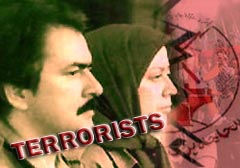The case of Hamid Aboutalebi and his adventurous story to become the Iranian ambassador in Tehran once more discloses the controversial history of the Iranian terrorist cult the Mujahedin Khalq
 Organization. While U.S. denied Abutalebi a visa, citing his connection to the 1979 hostage crisis and Iran eventually rejected a U.S. decision to deny a visa for its newly appointed ambassador to the United Nations, the MKO tries to whitewash its anti Imperialism background in a bid to obtain more support among its American friends.
Organization. While U.S. denied Abutalebi a visa, citing his connection to the 1979 hostage crisis and Iran eventually rejected a U.S. decision to deny a visa for its newly appointed ambassador to the United Nations, the MKO tries to whitewash its anti Imperialism background in a bid to obtain more support among its American friends.
"American law allows the Washington government to bar UN diplomats who are considered national security threats" reported CBC News. "But Obama’s potentially precedent-setting step could open the U.S. to criticism that it is wielding its position as host nation to improperly exert political influence." [1] The MKO wants this "improperly exerted political influence" to work out because its survival as a formerly designated terrorist cult-like group is hinged on the support it can gain in the West. The more the MKO troubles the waters between Iran and the US the more it can survive.
But this time the disputed issue between Iran and the US terribly twists the history of the MKO as a group that originally "led a guerrilla campaign against the US-backed Shah of Iran in the 1970s". [2] Today for the MKO leaders the darkest part of their history is their former strong anti-American portrait that has shifted into a very pro-American mask. The hypocrisy of the MKO is once more disclosed.
In June 2011, Kenneth R. Timmerman, the American journalist cites from a series of documents on the MKO released by the State Department revealing," the group, known as the Mujahedin-e Khalq (MEK, or MKO), supported the takeover of the U.S. embassy in Tehran in November 1979." It seems that the MKO’s support for the embassy takeover was a miscalculation because they then failed to have a share in the newly established government of Iran. Timmerman suggests that it was "not a position to endear itself to U.S. diplomats – before its gradual elimination from the ruling coalition by Ayatollah Khomeini less than two years later."[3]
Therefore, along with their opportunistic substance, the MKO propaganda on the new dispute between the two governments is pushing a new campaign to buy more supporters in the US claiming "1979 US hostage takers are now senior Iranian officials & Rouhani cabinet members." The group lists a number of half true half fake photos to support such allegations.
As a matter of fact, the 52 American hostages were finally released after 444 days by the Iranian government – the move was harshly opposed by the MKO that at the time considered itself as "vanguard of struggle against the US Imperialism". It is worth to notice that the Islamic Republic did not kill or injure the US hostages but the MKO is the only Iranian group that has the blood of Americans in its hands. According to the U.S. Department of State the group conducted several assassinations of U.S. military personnel and civilians working in Iran during the 1970s. [4]
Thus it was not bizarre when they opposed the release of the hostages in 1981 by the Iranian state, and called for their execution instead. As a result they staged a large demonstration, based on the presentation of the MEK by the Foreign Affairs group of the Australian Parliament. [5]
To reverse their now-embarrassing past, the MKO claims that the killing of the US citizens during the 1970’s was committed by another fraction of the group that defected in the early years."But Mujahedin newsletters published in Iran in 1980 celebrated the murders, calling the U.S. victims ‘criminal agents of U.S. Imperialism in Iran’, notifies Kenneth Timmerman. [6]
On April 4, 2014, Robert Mackey of the NewYork times posted an article to investigate the role of Iranian Reformists in the embassy crisis in 1979. He puts the outcome of his research," No evidence has emerged to support claims that Mr. Aboutalebi was among the leaders of the embassy siege, which was well-documented by the international news media at the time."[7]
Denouncing the NCR’s claim to condemn Aboutalebi as the person who orchestrated the assassination of the member of the group, Mackey refers to the NCR as "The same exile group — whose militant wing, the Mujahedeen e-Khalq, or People’s Mujahedeen, was removed from the State Department’s list of foreign terrorist organizations only in 2012 after a well-financed Washington lobbying campaign". [8]
This shows that the MKO’s misinformation campaign to demonize the Iranian officials has no use except buying more sponsorship among US warmongers.
Mazda Parsi
[1]CBCNews, Hamid Abutalebi will be UN envoy despite U.S. visa denial, Iran says, April 12, 2014
[2] BBC, US warns dissident Mujahideen-e Khalq to leave Iraq camp, 18 June 2012
[3] R. Timmerman, Kenneth, State Department Documents Expose Iranian Terror Group, June 2011
[4] ibid
[5] Brew, Nigel, "Behind the Mujahideen-e-Khalq (MeK)", Foreign Affairs, Defense and Trade Group, Parliament of Australia, 2003
[6] R. Timmerman, Kenneth, State Department Documents Expose Iranian Terror Group, June 2011
[7]Mackey, Robert, Iran’s Reformers Include More Than One Former Hostage-Taker, The New York Times blog, April 4,2014

